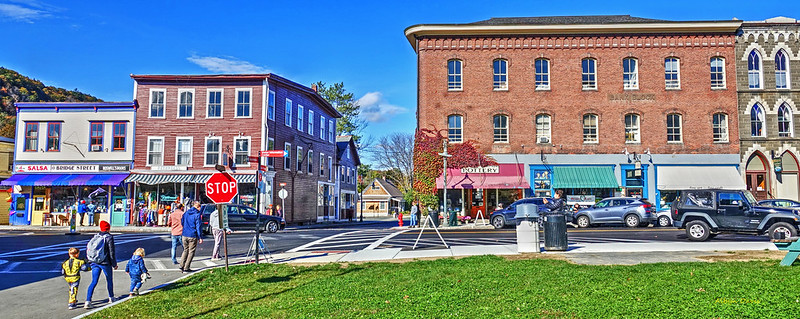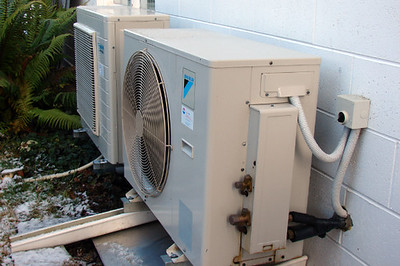People using Airbnb to book their Berkshires fall foliage getaway or summer escape to Cape Cod may arrive at a rental property that’s part of a new campaign to support hosts greening their homes. Airbnb has made the Bay State the starting point for its efforts to make rental properties listed on their site more energy efficient.
In May, Airbnb began subsidizing hosts in Massachusetts to make energy efficiency improvements to their rental homes. The program offers homeowners up to $2,000 to install heat pumps and $500 for weatherization upgrades, like insulation. The grants complement the state’s utility-supported Mass Save program, from which homeowners can receive up to $16,000 more for their heat pump as well as weatherization incentives like up to 100 percent off recommended insulation. Furthermore, they can be stacked atop tax credits offered by the federal Inflation Reduction Act (IRA), which includes a 30 percent tax credit for up to $2,000 spent on heat pumps.
All told, the Airbnb offer, mixed with state and federal incentives, is designed to bring heat pumps — which costs several thousands dollars at minimum — within reach for more Massachusetts hosts.
Since the IRA was signed last year, a wave of state and local policy has followed, as policymakers look to implement, unlock and maximize the law’s various benefits. But beyond this, many analysts agree that the IRA’s true potential for exponential impact will come through public policy catalyzing the private market.
Airbnb’s incentive is a prime example.
To access the grants from Airbnb, hosts must be Massachusetts residents and have homes powered by one of the sponsors of Mass Save: Berkshire Gas, Cape Light Compact, Eversource, Liberty, National Grid, or Until Electric. Signups for the pilot program were open until June 15 and home improvements will take place throughout the year. Hundreds of hosts have expressed interest, according to Airbnb representative Jackie McGraw.
Hosts participating in the pilot program are paired with a consultant from Massachusetts-based Abode Energy Management to guide them through the process at no cost.
“The early interest has been strong and the engagements we’ve had with hosts have been encouraging,” says Travis Estes, chief operating officer at Abode. “We feel good about early successes and feel they will lay the foundation.”
Airbnb’s financial incentive coupled with Abode’s guidance are meant to set hosts up for a successful experience electrifying and weatherizing their home. (Outside of Airbnb’s program, Abode’s services start at $150 for a consultation.)
“We see many customers get stalled out on heat pump adoption because they get frustrated,” says Estes. The heating and cooling systems can range thousands of dollars in price, and comparison shopping without an expert can be confusing, he said. Abode consultants guide hosts through the process, starting with an energy assessment from Mass Save, a collaborative of the state’s electric and gas utilities and energy efficiency service providers who implement energy efficiency programs in Massachusetts.
“Our hosts care a lot about sustainability,” says Clark Stevens, Airbnb’s Head of Stakeholder Initiatives, “and we’re always excited to find ways to support them in their goals.”

Switching from a fossil fuel-powered system to a heat pump system, which can lead to cheaper utility bills, can be particularly attractive to Airbnb hosts who rent out their homes to supplement their incomes. According to a self-reported survey last year, 45 percent of hosts rely on the money they earn from renting to help them stay in their home.
“So many of our hosts use our platform to help make ends meet,” he said. “Not only can we take steps to meet their sustainability goals, but these programs can help them with additional dollars.”
In Massachusetts, more than half of homes are heated by gas and nearly a quarter by fuel oil, according to the US Energy Information Administration. For these folks, switching to a heat pump means moving from carbon-intensive fuels to the electrical grid, which is currently powered by around 60 percent clean sources. In addition, switching off gas or fuel oil improves air quality.
As the program gets underway, Estes speculates that it could also inadvertently function as a marketing mechanism, as Airbnb guests encounter the heating/cooling technology for the first time.
“It’s an opportunity to expose so many guests to these kinds of improvements,” Estes says. “It’s really exciting — it means we’re to helping to convert our society as a whole to be more electrified and decarbonized.”
Having messaging supporting electrification from a large corporation like Airbnb can also make the concept feel more mainstream, says Kristin Eberhard, Senior Director of State & Local Policy for Rewiring America. One of the nonprofit’s primary goals is to electrify 1 billion machines across 121 million US households by 2050.
“It becomes more of a normal thing,” Eberhard said. “It’s not something you’re just hearing from your politicians or you’re just hearing from your climate change advocates.”
The Massachusetts program is the first time that Airbnb has offered grants like this in the US. The company launched similar programs in France and the UK last year, offering hosts thousands of euros to swap out old boilers.
Programs like the Airbnb grants also show an evolution of corporate responsibility in the climate space, says Amanda Sachs, a policy analyst at Rewiring America. While initially corporation looked to carbon offsets planting trees or protecting forests elsewhere in the world — and often with little accountability — there has been a shift toward programs that reduce pollution and emissions in the communities companies work in.
“It’s not just about looking like you’re going green,” Sachs says. “It’s about actual real, on-the-ground decarbonization projects, which will happen in a network of these homes.”
In the US, buildings account for 13 percent of overall greenhouse gas emissions. Gas is overwhelmingly responsible for those emissions, with about 80 percent coming from gas used in heating and cooking. This latest iteration of corporate programs looking to their own backyard comes from a realization that Americans still need to modernize their own homes and reduce emissions.
“We see that as bringing attention to that issue — that it’s not like we’re doing charity for somebody somewhere else,” Sachs says. “We actually have a lot that we can do right here for our own buildings.”
The current Airbnb grant pilot covers the two specific opportunities for weatherization projects and heat pumps, but the opportunity to discuss home electrification with hosts can open up a broader conversation about updates, Estes says.
“We’re able to help them start thinking about other improvements, like heat pump hot water heaters or EV chargers,” he says. “Once they start down this road, there’s a lot to consider.”










